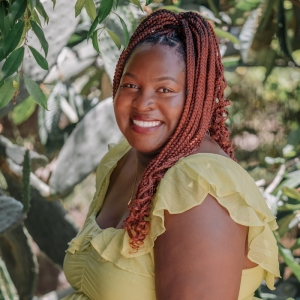Alumna Focuses on Self-Care and Wellness for Black Women
January 30, 2024 / by Jacqueline Mazarella- Alumni
In 2016, Oludara Adeeyo, MSW’19, embarked on a major life change to heal herself from traumatic experiences, and regain a sense of optimism for what she could offer to the world. Now, she is helping other Black women to do the same.
Combining her self-care journey, graduate education, experience as a licensed clinical social worker and ability to craft a story, Adeeyo has published a series of self-care books focused on supporting the well-being of Black women, improving their mental health and providing tools to eliminate stress and promote self-advocacy.
Her first book, “Self-Care for Black Women: 150 Ways to Radically Accept & Prioritize Your Mind, Body, & Soul,” was published in January 2022. For the second, Adeeyo was inspired by her own love of journaling to create “Affirmations for Black Women: A Journal: 100+ Positive Messages and Prompts to Affirm Your Self-Worth, Empower Your Spirit, & Attract Success,” which is more of an action-oriented practice. After witnessing a surge in the market for adult coloring books, and increased representation for people of color, she felt the natural progression for her series of books should move in this direction, and recently published “Mind, Body, & Soul: A Self-Care Coloring Book for Black Women.”
"In processing my own trauma, I learned several regular tips for self-care,” Adeeyo said. “I realized certain things that really helped me take care of myself, made me feel sane, and safe and secure enough to face the world.”
Collaborating with artist Tess Armstrong for all three books, Adeeyo feels they have created something very special.
“We’re envisioning a world of wellness for Black women together,” Adeeyo said.
A journey to realizing self-care
Adeeyo began her professional career as a journalist, and dreamed of one day becoming a magazine editor. Shortly after receiving her degree in journalism and women’s studies, Adeeyo landed a job at Cosmopolitan Magazine in New York. Initially, she felt like a valued member of the team. However, after five years in the industry, she was experiencing severe stress and depression.
“In the beginning it was a pleasant experience,” Adeeyo said. “But then I began to experience what now I can label as workplace trauma — a lot of bullying, harassment and probably workplace racism.”
Around the same time, her mother became seriously ill with complications from an auto-immune disease. Adeeyo began caring for her mother every day before and after work and on the weekends, until she passed away in 2013.
By 2016, Adeeyo decided she could no longer tolerate what she describes as a “hellish work environment.” After seven years in media, she needed a major life change.
“I didn't really see a future in journalism anymore,” Adeeyo said. “Nothing enticed me about it. Several friends were also questioning their initial career choices and talking about alternatives.” One of them suggested Adeeyo explore the possibility of social work.
Sharing her skills with other Black women
Adeeyo visited Los Angeles in 2016 for an open house at USC. She fell in love with the city and the Master of Social Work (MSW) program. She was accepted as an MSW student, and chose to focus on how to empower and educate Black women about their wellness and mental health. In her classes, she was immediately exposed to conversations about diversity, the correlation between stress and race, and the various communities where social workers can implement real change. It opened her eyes.
“Once I decided on social work I began to have visions and dreams of what my future could hold, of what it could look like,” Adeeyo said.
Everything about the MSW program validated her decision to change careers, and made Adeeyo feel like she was on the right path. As her education continued, her mother’s lived experiences, as well as her own, began to influence how she wanted to move forward in her career.
“My mother was a very stressed woman,” Adeeyo said. “I started to think about intergenerational trauma, my own self-care and wellness, and how I could use what I was learning and apply it to the public.”
For her practicum placement, Adeeyo worked with the Los Angeles County Department of Mental Health, and landed her first job post-graduation as a psychiatric social worker in the Downtown Mental Health Center, where she worked until March 2023.
During the COVID-19 pandemic, when everyone was forced to slow down, Adeeyo took this time to think about what was next for her. As many people did, she sought out online forums for connection, and was very vocal about her own journey of healing and therapy, as well as the overall issue of Black women and wellness.
In 2021, an editor from Adams Media, an imprint of publisher Simon & Schuster, read some of Adeeyo’s online commentary and approached her about developing a self-care book.
“It felt cosmic,” Adeeyo said. “It felt like the right timing, and it just aligned very well. This was my opportunity to provide advice and resources for Black women.”
Adeeyo recently launched a private practice, Dark Berry Wellness, where she specializes in providing care for marginalized populations, particularly helping Black women manage their stressors and build self-confidence. Her main goal is to see people express and care for their full selves.
And, of course, she is musing on the subject for her next book.
To reference the work of our faculty online, we ask that you directly quote their work where possible and attribute it to "FACULTY NAME, a professor in the USC Suzanne Dworak-Peck School of Social Work” (LINK: https://dworakpeck.usc.edu)
